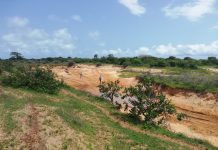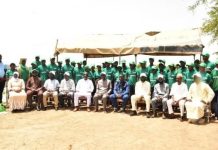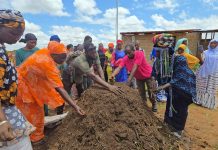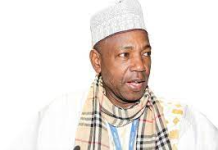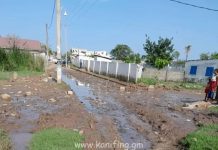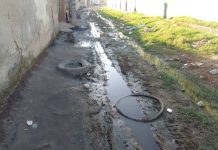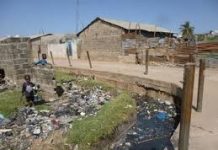By Assan Bah
The National Human Rights Commission (NHRC) in its 2024 State of Human Rights report called on the Ministry of Fisheries and Water Resources to put in place a proper mechanism to monitor the implementation of the Gambia-Senegal Fishing Agreement as well as other fishing agreements between The Gambia and other countries and companies.
Below is extracted from the Commission’s Report on “Business and Human Rights.”
“In The Gambia, despite the absence of major multinational cooperations in the business sector, the activities of small and medium businesses in the fisheries, sand mining and other areas have been having an impact on the enjoyment of human rights in the country.”
Reports of devastating impacts of sand mining on private property and the environment in Gunjur made headlines in 2024. The reports indicate that around the ‘Senya Forest’ miners are increasingly targeting private lands and sand dunes on the beach.45 Residents, including property owners around the sand mining areas, have reported their concerns as trucks frequently knock down fences and trespass on properties to access, steal and/or extract sand.
While sand mining companies have turned their attention to dredging as an alternative source of sand mining, the impact of dredging can be devastating on coastal and marine ecosystems.
The US State Department reported that although the Government of The Gambia has specified in law or regulation the criteria and procedures for awarding natural resource extraction contracts and licenses, it does not appear to be following them in practice.
Basic information on natural resource extraction awards is not always publicly available.
The Ministry of Fisheries and Water Resources has been working on a Draft Fisheries Amendment Bill 2023 and Draft Fisheries Amendment Regulations 2023 and are planning to develop a National Action Plan. However, neither document has come into effect. The existing regulations have not been properly implemented.
In April 2024, the German-based Deutsche Welle reported that artisanal fishermen in coastal communities of Sanyang and other communities in the Kombo South compete with industrial trawlers for scarce fish at sea. The impact of overfishing is exacerbated by the coastal pollution from the fishmeal factories.
Despite several alarming reports of overfishing in The Gambia, an agreement between Senegal and The Gambia allows ‘Senegal to put 250 boats in Gambian waters, ranging from 40 horsepower boats to industrial trawlers. Article 1 of the Agreement allows the fishermen from Senegal to fish in Gambian waters. While the Agreement provides a limit on the number of boats allowed to come from Senegal, there is no monitoring mechanism to ensure proper implementation. This could exacerbate the scarcity of fish for consumption in The Gambia and the resultant loss of livelihood income for fishmongers and fisher families. With Article 1 of the Agreement allowing fishermen to land their catch in either country, and Senegalese having the higher buyer power, experts believe that this leaves Gambian consumers vulnerable.
In its 2024 National Human Rights Report submitted to the UPR Working Group, The Gambia acknowledged the existence of ‘enormous Illegal, Unreported and Unregulated Fishing (IUUF), Agreement Between the Government of the Republic of Senegal and The Government of the Republic of The Gambia in The Field of Fisheries and Aquaculture.
Article 1. 35 illegal mining and logging, which have contributed in no small measure to insufficient fish supply and food insecurity, as well as hazardous land degradation. Overfishing and misuse of fishery resources by foreign-owned industrial trawlers, fish mills, and fish oil plants threaten the human rights, especially the right to food of the fishing communities, and the country at large.
The UN Guiding Principles on Business and Human Rights is not widely known by businesses, civil society, the media and the public. The Government has not adequately popularised the Principles. Additionally, there is no National Action Plan on Business and Human Rights.
Recommendations:
1. The Ministry of Fisheries and Water Resources put in place a proper mechanism to monitor the implementation of the Gambia-Senegal Fishing Agreement as well as other fishing agreements between The Gambia and other countries and companies.
2. The Ministry of Fisheries and Water Resources to review regional and international fishing agreements entered into by The Gambia to ensure artisanal fishermen have access to fish.
3. The Ministry of Fisheries and Water Resources to fast track the review of the national legal frameworks (Draft Fisheries Amendment Act 2023 and Draft Fisheries Amendment Regulations 2023) and development of National Action Plan.
4. The Ministry of Petroleum, Energy and Mines (MoPEM), in accordance with the UN Guiding Principles on BHR, to regulate mining and ensure full environmental impact assessment is done before issuing mining licenses.
5. The Ministry of Trade to widely popularise the UN Guiding Principles on Business and Human Rights, especially among businesses in the country.
6. The State to develop a National Action Plan on Business and Human Rights and provide adequate resources for its implementation.”


